

Virginia Woolf - Home. George Eliot, 1819-80 (Mitsu Matsuoka, Nagoya University, Japan) It seems to me we can never give up longing and wishing while we are thoroughly alive.

There are certain things we feel to be beautiful and good, and we must hunger after them. "George Eliot" by Virginia Woolf. George Eliot was the pseudonym of novelist, translator, and religious writer Mary Ann Evans (1819-1880).
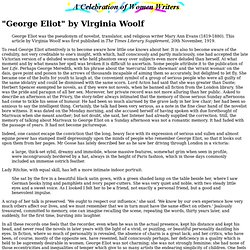
This article by Virginia Woolf was first published in The Times Literary Supplement, 20th November, 1919. To read George Eliot attentively is to become aware how little one knows about her. It is also to become aware of the credulity, not very creditable to one's insight, with which, half consciously and partly maliciously, one had accepted the late Victorian version of a deluded woman who held phantom sway over subjects even more deluded than herself. At what moment and by what means her spell was broken it is difficult to ascertain. Naomi Mitchison. Naomi Mitchison, c1920s Naomi May Margaret Mitchison, CBE (née Haldane; 1 November 1897 – 11 January 1999) was a Scottish novelist and poet.
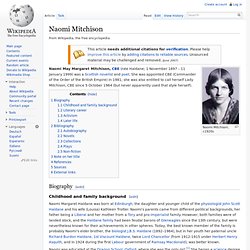
She was appointed CBE (Commander of the Order of the British Empire) in 1981; she was also entitled to call herself Lady Mitchison, CBE since 5 October 1964 (but never apparently used that style herself). Biography[edit] Childhood and family background[edit] Oresteia, Aeschylus- Justification of sexual terrorism. Le viol et les romans de femmes. C’est l’histoire d’une fille nue avec un garçon.

Ils sont dans une voiture garée sur un parking, quelque part devant une enseigne de gaufres, dans l’Etat de Géorgie, aux Etats-Unis. La police arrive, leur demande de se rhabiller. L’homme obéit très vite. La femme non. La police rapporte à la presse locale qu'elle est restée «simplement assise» sur le siège passager, que «l’officier dut lui demander à de nombreuses reprises de remettre ses vêtements. Publicité. McClure, L.: Spoken Like a Woman: Speech and Gender in Athenian Drama. (Paper) In ancient Athens, where freedom of speech derived from the power of male citizenship, women's voices were seldom heard in public.
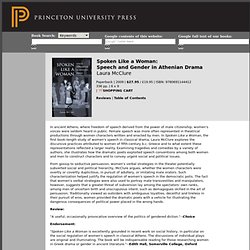
Female speech was more often represented in theatrical productions through women characters written and enacted by men. In Spoken Like a Woman, the first book-length study of women's speech in classical drama, Laura McClure explores the discursive practices attributed to women of fifth-century b.c. Greece and to what extent these representations reflected a larger reality. Una Marson. Una Maud Victoria Marson (5 May 1905 – 1965) was a Jamaican feminist, activist and writer, producing poems, plays and programmes for the BBC.
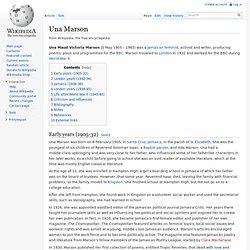
Marson traveled to London in 1932 and worked for the BBC during World War II. Early years (1905-32)[edit] Jean Rhys, by Elaine Savory. Mahadai Das. Mahadai Das was a Guyanese poet.
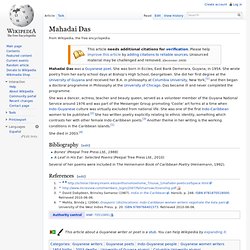
She was born in Eccles, East Bank Demerara, Guyana, in 1954. She wrote poetry from her early school days at Bishop's High School, Georgetown. She did her first degree at the University of Guyana and received her B.A. in philosophy at Columbia University, New York,[1] and then began a doctoral programme in Philosophy at the University of Chicago. Das became ill and never completed the programme. THEATRE REVIEW: FOR COLORED GIRLS. You no doubt know of Tyler Perry's 2010 film For Colored Girls starring Kerry Washington, Thandie Newton, Janet Jackson and Macy Gray to name a few.

What you may not be familiar with is the fact that the film began life as Ntozake Shange's choreopoem For Colored Girls Who Have Considered Suicide/When the Rainbow Is Enuf. Chimamanda Ngozi Adichie. Chimamanda Ngozi Adichie talks about The Thing Around Your Neck on Bookbits radio.
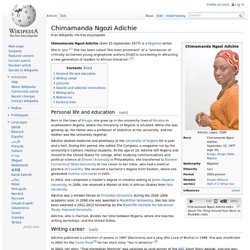
Chimamanda Ngozi Adichie (born 15 September 1977) is a Nigerian writer. She is Igbo . [ 1 ] She has been called "the most prominent" of a "procession of critically acclaimed young anglophone authors [that] is succeeding in attracting a new generation of readers to African literature". [ 2 ] Personal life and education [ edit ] Born in the town of Enugu , she grew up in the university town of Nsukka in southeastern Nigeria, where the University of Nigeria is situated.
While she was growing up, her father was a professor of statistics at the university, and her mother was the university registrar. Adichie studied medicine and pharmacy at the University of Nigeria for a year and a half. In 2003, she completed a master's degree in creative writing at Johns Hopkins University . Theatre director : playwright. MoLoRa, by Yaël Farber. Beneath the Skin of "Her Naked Skin" (Photo credits to Johannes Hjorth) As we get to the end of a year in which Cambridge theatre seems to have tried hard to increase the exposure given to women, even now in the midst of exams, it seems like a good idea to take a step back and explore the nature of the plays themselves.

Suheir Hammad: Poems of war, peace, women, power. Lily Myers - "Shrinking Women" (CUPSI 2013) Black Orpheus - Spoken Word - Justina Kehinde. Women in Literature. Feminist literary criticism. Feminist Fiction. Female Tradition as Feminist Innovation by Annie Finch. Introduction Annie Finch is a contemporary American poet whose work is deeply engaged with the connection between feminism and formalism. This essay, “Female Tradition as Feminist Tradition,” which was published in her essay collection The Body of Poetry (2005), traces the historical and psychological paths that have drawn contemporary women poets toward the use of traditional formal structure, despite a lack of critical and theoretical attention. Finch first locates her work within the historical context of women writing in form.
She asserts the feminist aspect of utilizing traditional formal structure and pattern in the face of a history that has often spoken against—and over—women’s voices. Finch observes that unlike male poets, women poets do not have a canon of established female formal poets against whom to define themselves. Book News: Women Writers Dominate Children's Books, Right? Wrong. : The Two-Way. Wikipedia’s Sexism Toward Female Novelists. The intention appears to be to create a list of “American Novelists” on Wikipedia that is made up almost entirely of men. The category lists 3,837 authors, and the first few hundred of them are mainly men. The explanation at the top of the page is that the list of “American Novelists” is too long, and therefore the novelists have to be put in subcategories whenever possible. Too bad there isn’t a subcategory for “American Men Novelists.” Femmes dans les manuels scolaires de Français : selon une étude, elles sont stéréotypées et sous-représentées.
“Où sont les femmes?” , comme dit la chanson ? Pas dans les manuels scolaires, en tout cas. Pour Wikipedia, les femmes ne sont pas des écrivains comme les autres. Il y a les écrivains, et il y a les écrivains femmes. Wikipedia bumps women from 'American novelists' category. Gender, desire, and power in 19th century French culture. Rrose Sélavy. Un article de Wikipédia, l'encyclopédie libre. Rrose Sélavy est un personnage fictif créé par le peintre français Marcel Duchamp en 1920. Histoire[modifier | modifier le code] [FAAAM : Femmes Auteurs Anglo-AMéricaines] Joyce Carol Oates: en littérature, il n’existe pas une voix mais un œil féminin. Pour dire l’importance du langage, cette phrase de Camus revient souvent: «Mal nommer un objet, c'est ajouter au malheur de ce monde.» Camus ne faisait que reprendre une idée de Platon: dans le Phédon, Socrate disait ainsi à Criton «Sache bien en effet, qu’un langage impropre n’est pas seulement défectueux en soi, mais qu’il fait encore du mal aux âmes». publicité C’est précisément de ça, du langage et des âmes, que parle Joyce Carol Oates dans son dernier roman, Mudwoman, sorti en France le 3 octobre chez Philippe Rey.
'The Birthmark' - Nathaniel Hawthorne. George R. R. Martin on writing women. Mrs Warren's Profession, by George Bernard Shaw. The politics of rape: Traces of radical feminism in Disgrace by J. M. Coetzee. L’éternel détournement de Dolorès Haze. C’est une petite victime très particulière que je voudrais évoquer ici. Elle s’appelait Dolorès Haze et venait d’avoir douze ans quand son agresseur l’a prise dans ses filets.
Elle vivait avec sa mère ni très chaleureuse ni très protectrice dans une petite ville quelconque des Etats-Unis. Sa vie bascule quand un élégant étranger s’installe pour quelques mois dans la chambre mise en location par Mme Haze. Celle-ci tombe rapidement amoureuse du beau locataire, tandis que celui-ci se prend de passion pour … Dolorès. Il courtise la mère pour approcher la fille, selon une stratégie bien connue et projette même de tuer Mme Haze après l’avoir épousée. C’est le surnom charmant que donnait à Dolorès son tourmenteur qu’a généralement retenu le public : « Lolita ». La monja gitana - Poemas de Federico García Lorca.